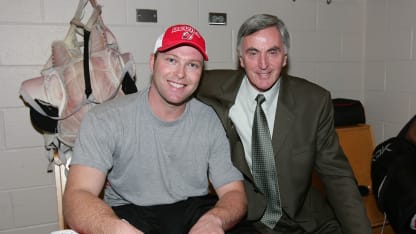Jacques Caron worked with Martin Brodeur for 20 NHL seasons as the New Jersey Devils goaltending coach and a special assignment coach. Under Caron's tutelage, Brodeur won the Calder Trophy as the NHL's top rookie in 1993-94 and the Vezina Trophy as the League's best goaltender in 2002-03, 2003-04, 2006-07 and 2007-08, and he helped the Devils win the Stanley Cup in 1995, 2000 and 2003. Brodeur retired in 2015 as the NHL's all-time leader with 691 wins and 125 shutouts. Here Caron, 79, shares his thoughts on Brodeur, who will go into the Hockey Hall of Fame on Monday, in a special testimonial for NHL.com:
Brodeur driven to Hockey Hall of Fame by love of game, Caron says
Former Devils goalie coach believes enjoyment led to longevity for NHL's all-time leader in wins, shutouts

© Len Redkoles/Getty Images

















